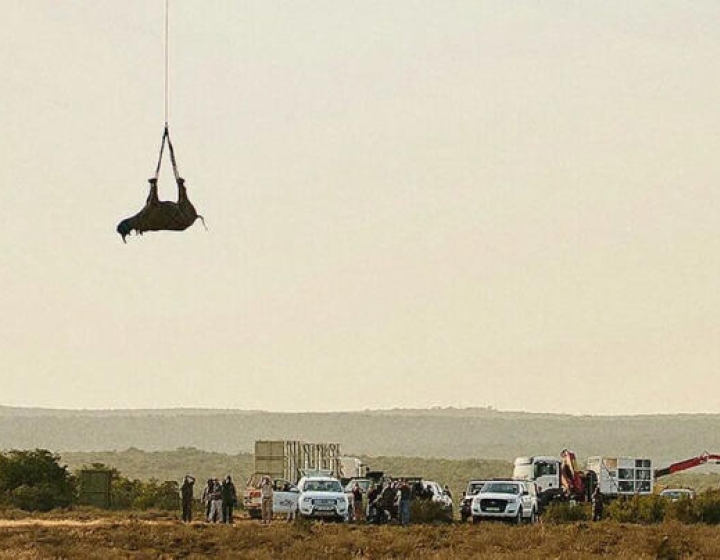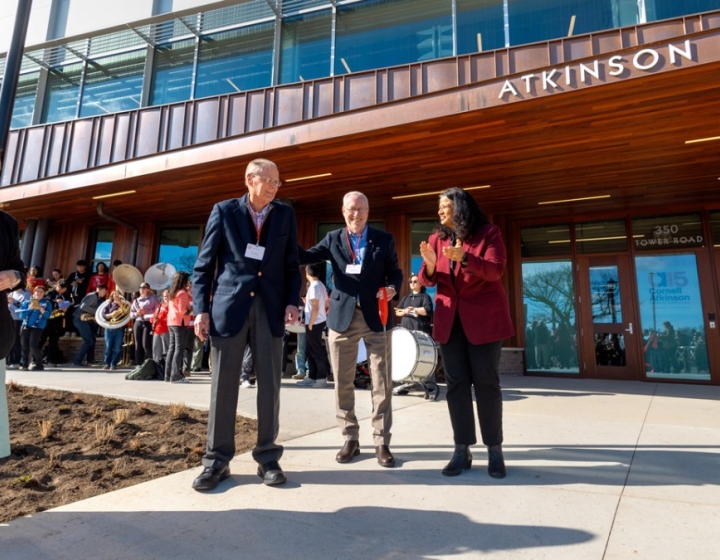Shelter medicine pioneer receives alumni association's highest honor
Dr. Lila Miller ’77 will be recognized with the Daniel Elmer Salmon Award for Distinguished Alumni Service, given annually by the Alumni Association of the College of Veterinary Medicine at Cornell University. To be presented at the New York State Veterinary Conference, in October 2014, the award recognizes and honors Cornell University College of Veterinary Medicine DVM graduates who have distinguished themselves in service to the profession, their communities, or the College
Miller is a world recognized expert in animal cruelty and shelter medicine and is a leading advocate for companion animal welfare in the U.S. and abroad. She was selected for her commitment and accomplishments related to teaching and clinical practice in veterinary medicine as well as her service to Cornell, organized veterinary medicine, animal welfare organizations, and society as a whole through her pioneering work in shelter medicine.
Miller surmounted a grave challenge to fulfill her lifelong dream of being a veterinarian. In her third year of veterinary school, she developed asthma and allergies so severe that they nearly claimed her life, sending her to the university clinic several times a week, culminating in hospitalization in the intensive care unit at the hospital. She had grown allergic to horses, and her allergist predicted she would develop similar allergies to cats and dogs within a couple years.
“I was having asthma attacks almost every day in vet school and thought I wouldn’t be able to finish,” said Miller. “But everything I’d done from childhood on was working toward being a veterinarian. I decided to take it as far as I could.”
She took her chances, graduated successfully, and launched into what at the time was a novel field: working as a veterinarian at the ASPCA shelter. At a time when shelter medicine was not a recognized field and had no formal structure, recognition, or standardized protocols, Miller spent her first five years working in the trenches of a shelter as animal care supervisor, where she developed some of the first protocols and guidelines for the healthcare of shelter animals.
“When I graduated there was no such thing as shelter medicine, and when I first went to work in a shelter it was awful because the outcomes for most of the animals were so depressing,” said Miller. “It seemed like a hopeless situation. I’d guess Eighty percent of animals were put to sleep. But I also saw it as an opportunity to have an impact on whole populations of animals in a way private practitioners can’t. I said to myself, ‘there’s so much we can do here, we can start vaccinating and saving lives."
Expanding her role in the burgeoning field, Miller moved on to become Director of the ASPCA Brooklyn Clinic in an impoverished area, where she spent 15 years overseeing the care of thousands of shelter animals and while providing care for the pets of owners who may otherwise not have been able to afford it.
“It was an environment in which we were helping underserved people and pets who would otherwise suffer or be put to sleep,” said Miller. “This was very satisfying work and I’m grateful to the ASPCA for giving me the opportunity to explore something that hadn’t been done before.”
While in this role, Miller began an outreach program for veterinarians to enhance their understanding of the importance of companion animal welfare and shelter medicine. As part of this effort she made extensive contributions to teaching throughout the country and the world. Invited by Dr. Janet Scarlett, a Cornell professor of epidemiology, Miller co-taught the first didactic course in shelter medicine in the country in 1999 at Cornell and became an Adjunct Assistant Professor. Scarlett went on to found the Maddie’s® Shelter Medicine Program at Cornell.
Miller has taught annual lectures regarding shelter medicine, disease transmission, animal cruelty, euthanasia and veterinary ethics at veterinary colleges throughout the US. She has been invited to speak throughout the country and the world regarding cruelty, disease transmission, pediatric neutering and related topics. To support the growing interest in learning shelter medicine, Miller co-edited the first three books that facilitated the training of shelter medicine veterinarians: Shelter Medicine for Veterinarians and Staff, 1st edition, Ames, IA: Wiley Blackwell, 2004; Shelter Medicine for Veterinarians and Staff, 2nd edition, Ames, IA: Wiley Blackwell, 2013; and Infectious Disease Management in Animal Shelters, 1st edition, Ames, IA: Wiley Blackwell, 2009.
Miller cofounded the Association of Shelter Veterinarians, which now has over 700 members from around the world. She has served organized veterinary medicine in many ways, including serving on state and national boards. Her efforts have been widely recognized as evidenced in the numerous awards she has received. She has been a leading advocate for animal welfare and a key contributor to the new discipline of shelter medicine.
The Salmon award is named in honor of Cornell's first DVM graduate, who is remembered for his pioneering work in controlling contagious animal diseases in the early 20th century. D.E. Salmon was one of Dr. James Law's first students when Cornell University opened its doors in 1868. He received the Bachelor of Veterinary Science degree from Cornell in 1872, and he was awarded the Doctor of Veterinary Medicine degree in 1876, the first DVM degree to be awarded in the United States of America. Dr. Salmon’s contributions to veterinary medicine and human medicine were numerous and significant, including private practice, government service, foreign service, food inspection, and leadership in identifying significant bacterial diseases, including salmonella.





